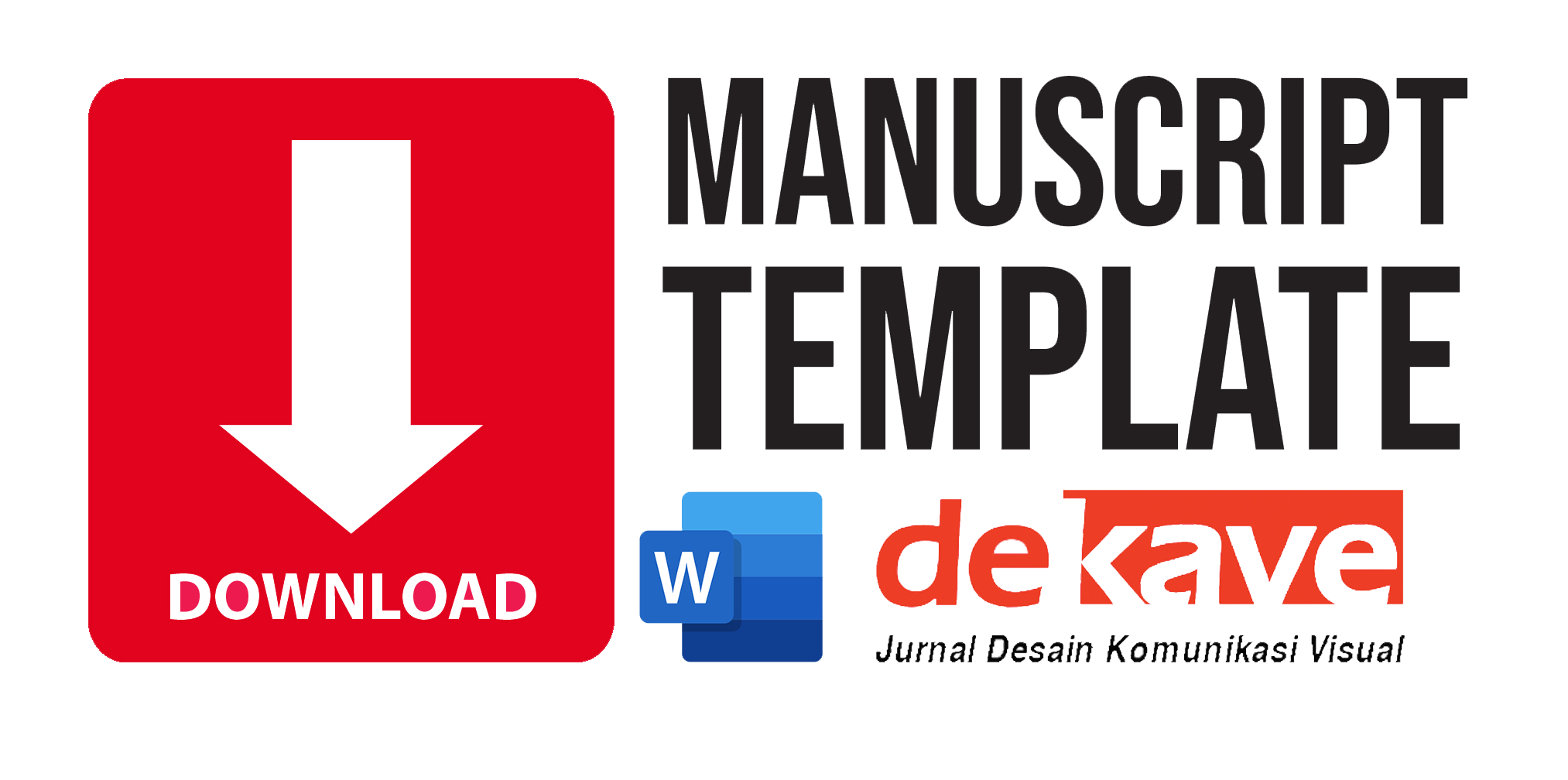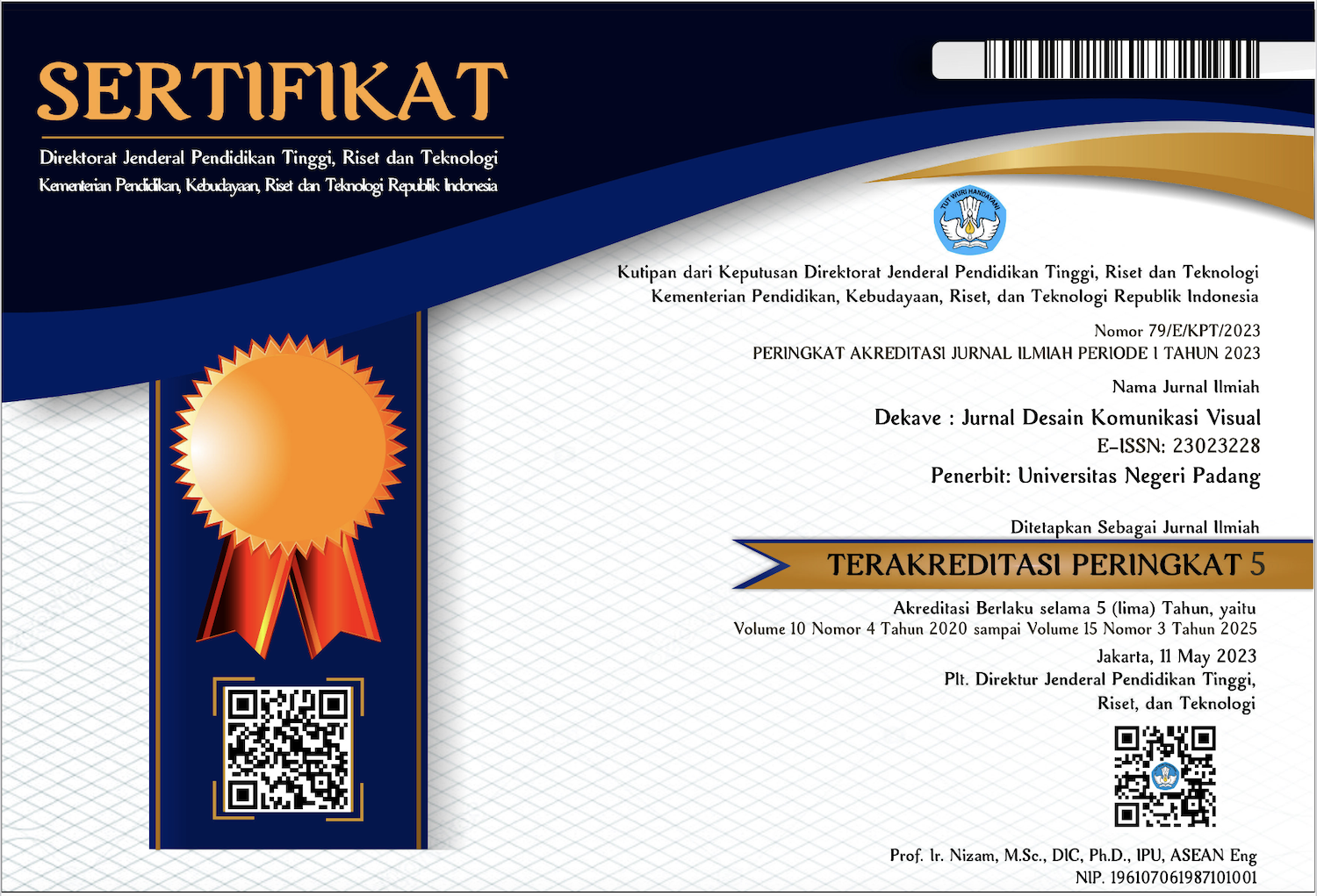Editorial Policies
Focus and Scope
Jurnal Dekave menyambut baik kiriman yang memberikan wawasan tentang isu-isu terkini dan utama yang berhubungan dengan studi desain komunikasi visual. Jurnal ini menyediakan tempat bagi para peneliti dan praktisi desain komunikasi visual untuk berdiskusi, mengejar dan mempromosikan pengetahuan di bidang yang muncul dan berkembang dalam studi desain komunikasi visual. Bahasa naskah bisa dalam bahasa Indonesia. Harus ada diskusi kritis tentang masalah dan kontribusi baru dan signifikan untuk bidang terkait. Artikel dapat berasal dari salah satu bidang berikut:
- desain merek & identitas
- pemasaran visual
- periklanan
- fotografi
- desain grafis lingkungan
- multimedia
- manajemen desain
- industri kreatif
- kajian budaya
Section Policies
Articles
 Open Submissions
Open Submissions Indexed
Indexed Peer Reviewed
Peer Reviewed
Peer Review Process
Setiap makalah yang dikirimkan ditinjau secara independen oleh reviewer. Keputusan untuk publikasi, perubahan, atau penolakan didasarkan pada laporan / rekomendasi mereka. Jika dua atau lebih reviewer menganggap sebuah naskah tidak cocok untuk publikasi di jurnal ini, pernyataan yang menjelaskan dasar keputusan akan dikirim ke penulis.
Open Access Policy
This journal provides immediate open access to its content on the principle that making research freely available to the public supports a greater global exchange of knowledge.
Publication Ethics
Dekave : Jurnal Desain Komunikasi Visual is dedicated to following best practices on ethical matters, errors and retractions. The prevention of publication malpractice is one of the important responsibilities of the editorial board. Any kind of unethical behavior is not acceptable, and Dekave does not tolerate plagiarism in any form. Authors submitting articles to Dekave affirm that manuscript contents are original.
In order to achieve best practice, Dekave : Jurnal Desain Komunikasi Visual follows the COPE Code of Conduct and Best Practice Guidelines for Journal Editors and the Code of Conduct for Journal Publishers.
The following duties outlined for editors, authors, and reviewers are based on the Committee of Publication Ethics (COPE) and covers Code of Conduct for Authors, Reviewers, Editors. Editor In Chief & Managing Editors, Editorial Boards and Publisher will also adhere to the Dekave submission guideline policies.
Duties of the Authors
- Authors should present an accurate account of their original research as well as an objective discussion of its significance. Manuscripts will follow the submission guidelines of the journal. (See submission guideline policies)
- Have the responsibility of ensuring only new and original work is submitted.
- Authors must not submit the same manuscript to more than one journal concurrently. It is also expected that the author will not publish redundant manuscripts or manuscripts describing the same research in more than one journal.
- Must not submit any articles that are being reviewed or considered by the Dekave journal to other journals simultaneously.
- Authors should acknowledge all sources of data used in the research and cite publications that have been influential in the research work.
- Authorship should be limited to those who have made a significant contribution to conception, design, execution or interpretation of the reported study. Others who have made significant contribution must be listed as co-authors. Authors also ensure that all the authors have seen and agreed to the submitted version of the manuscript and their inclusion of names as co-authors.
- Authors should provide raw data related to their manuscript for editorial review and must retain such data.
- If at any point of time, the author(s) discovers a significant error or inaccuracy in submitted manuscript, then the error or inaccuracy must be reported to the editor.
- Are only allowed to publish their work elsewhere after receiving a formal rejection from the journal or if their request to withdraw their work is officially accepted by the journal.
- Should make significant contributions and be held accountable for any shortcoming in their work.
Duties of the Reviewers
- Information regarding manuscripts submitted by authors should be kept confidential and be treated as privileged information.
- Can refuse to review any submission due to a conflict of interest or inadequate knowledge.
- Manuscript reviewers must ensure that authors have acknowledged all sources of data used in the research. Any kind of ethical misconduct, similarity, or overlap between the manuscripts under consideration or with any other published paper of which reviewer has personal knowledge must be immediately brought to the editor's notice.
- Review of submitted manuscripts must be done objectively, fairly, and the reviewers should express their views clearly and professionally with supporting arguments.
- Must disclose any competing interest before agreeing to review a submission.
- In the event that a reviewer feels it is not possible for him/her to complete review of manuscript within stipulated time then this information must be communicated to the editor, so that the manuscript could be sent to another reviewer.
- Should ensure the originality of a submission and be alert to any plagiarism and redundant publication.
- Must not discuss the content of the submission without permission.
- Adhere to the time allocated for the review process. Requests for extension to review the submission is at the discretion of the Editor-in-Chief.
Duties of the Editors
- Based on the review report of the editorial review board, the editor can accept, reject, or request modifications to the manuscript.
- Each editor must ensure that each manuscript is initially evaluated by the editor for originality, making use of appropriate software to do so. Following desk review, the manuscript is forwarded blind peer review to the editorial review board who will make a recommendation to accept, reject, or modify the manuscript.
- The editor must ensure that each manuscript received by Dekave : Jurnal Desain Komunikasi Visual is reviewed for its intellectual content without regard to sex, gender, race, religion, citizenship, etc. of the authors.
- The editor must ensure that information regarding manuscripts submitted by the authors is kept confidential.
- The editor will not use unpublished materials disclosed in a submitted manuscript for his/her own research without written consent of the author.
Duties of the Editorial Board Members
- Actively contribute to the development and the greater good of the journal.
- Act as ambassadors for the journal.
- Continuously support and promote the journal.
- Review any work assigned to them.
Duties of the Editor-in-Chief & Managing Editors
- Evaluate manuscripts fairly and solely on their intellectual merit.
- Ensure confidentiality of manuscripts and not disclose any information regarding manuscripts to anyone other than the people involved in the publishing process.
- Has the responsibility to decide when and which articles are to be published.
- Actively seek the views of board members, reviewers and authors on how to improve/ increase the image and visibility of the journal.
- Give clear instructions to potential contributors on the submission process and what is expected of the authors.
- Ensure appropriate reviewers are selected/ identified for the reviewing process.
Duties of the Publisher
Handling of unethical publishing behaviour
In cases of alleged or proven scientific misconduct, fraudulent publication or plagiarism, the publisher, in close collaboration with the editors, will take all appropriate measures to clarify the situation and to amend the article in question. This includes the prompt publication of an erratum, clarification or, in the most severe case, the retraction of the affected work. The publisher, together with the editors, shall take reasonable steps to identify and prevent the publication of papers where research misconduct has occurred, and under no circumstances encourage such misconduct or knowingly allow such misconduct to take place.
Access to journal content
The publisher is committed to the permanent availability and preservation of scholarly research and ensures accessibility by partnering with organizations and maintaining our own digital archive.
Disclaimer
The Editors of Dekave make every effort to ensure the accuracy of all the information (the “Content”) contained in its publications. However, the Editors of Dekave make no representations or warranties whatsoever as to the accuracy, completeness or suitability for any purpose of the Content and disclaim all such representations and warranties whether express or implied to the maximum extent permitted by law. Any views expressed in this publication are the views of the authors and are not necessarily the views of the Editors of Dekave.
Indexing and Abstracting
Dekave : Jurnal Desain Komunikasi Visual, an nasional peer-reviewed online journal in social science and visual communication design published by Program Studi Desain Komunikasi Visual FBS Universitas Negeri Padang, Indonesia.
ISSN 2528-3936 (Online)
Dekave : Jurnal Desain Komunikasi Visual has been indexed on, among others:
Journal History
Dekave : Jurnal Desain Komunikasi Visual pertama kali diterbitkan tahun 2012 oleh Program Studi Desain Komunikasi Visual. Jurnal ini kemudian dikelola untuk terbitan artikel mahasiswa Prodi Desain Komunikasi Visual UNP. Sejak 2020, Dekave : Jurnal Desain Komunikasi Visual merevisi nomor terbitan tanpa seri. Mulai terbitan tahun 2021 Vol.11 No.2 menggunkan template permanen sesuai dengan kaidah terbitan jurnal.
Dekave : Jurnal Desain Komunikasi Visual sekarang terbit sebagai jurnal peer-review yang dikhususkan untuk publikasi makalah asli. Ini berfungsi sebagai forum untuk pendekatan praktis untuk meningkatkan kualitas dalam isu-isu yang berkaitan dengan penelitian di sosial dan humaniora. Dekave : Jurnal Desain Komunikasi Visual menerima artikel dalam bentuk laporan penelitian tentang ilmu sosial dan humaniora.
Publication Frequency
Dekave : Jurnal Desain Komunikasi Visual published articles in four times a year, i.e. March, June, September and Desember.





